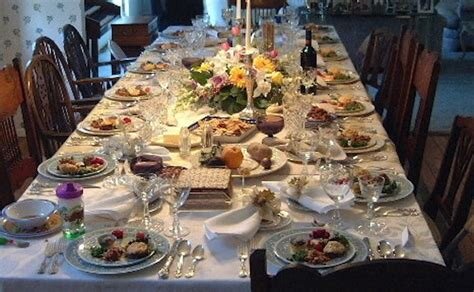Here in Connecticut, we’re just beginning to approach the high tide of illness and grief that will reach us over the coming days. The epidemiologists are predicting a peak of deaths from The Virus in two weeks. To be sure, the overwhelming majority of us will survive, and most with little more than a hiccup. But the sheer scale of infection will leave none of us untouched.
As I write this, I am sadly watching my wife prepare for tonight’s Passover seder. Passover, the Jewish holiday of grief, redemption and joy, has always been her holiday, and she would begin weeks in advance to prepare the meal. On this evening the table, surrounded by as many as 20 family members, would hold the feast and the love with which Jews have always recalled their slavery and celebrated their freedom.
Tonight it will be just her and I and two dogs, sitting down to a meal that will be no less grand, but lacking for the warmth and the love of our family, today separated less by miles and more by the micrometer’s length of a strand of RNA. My thoughts turn to my youngest daughter, for the first time cooking her own seder in her own kitchen, and my eldest, who survived the infection but remains in quarantine in London. I am at a loss for their absence. It lies heavy on my heart.
And I am sure it will be much the same for my Christian friends this weekend, as they weep for the death and rejoice in the return of their savior, and who will similarly be missing the kinship of worship with others and feasting with family. Religious or secular, this time of separation is painful for all of us. Humans are not designed to be atoms of existence separated by empty, unbearable, space.
And it’s far from over. We haven’t even gotten to the bad part yet, where some will be lost to our celebratory tables forever, and some of us will lose even a table to sit at and food to put on it.
Among the wash of emotions that I’m seeing in my patients and on social media is a rising tide of anger. Anger that we’ve been ill served by those elected to act on our behalf and who instead did nothing. And when they did decide to do something, it was only to turn our tragedy into their profit.
Anger and sadness and fear is a potent mix, and the resulting explosion is rarely good. It is how jihads are created. Then again, we are Americans, born of revolution and survivors of civil war, and our inclination to reach for the best of what the founders imagined is strong. Though as any Native American, or immigrant of color or non-Christian can tell you, we repeatedly, and often dismally, fail in that regard. Nonetheless, we strive to make the ideal real.
The internet is awash with people and virtual communities providing ways to help us cope. From virtual yoga classes to internet religious observances, from instructions on how to meditate to how to exercise, many are lending their expertise and their time to help us all find ways through this time.
I find to my dismay that I feel I have little to offer in that regard. I have spent most of my life helping others, but at this time of great need, I feel a bit hopeless. I am just a chiropractor, just a man who has thought about things, perhaps at times a little too much. The only thing I can offer you is just what I am. My ears to listen, my heart to respond, nothing more, and I urge each of you to do the same. What we cannot do singly, we can do jointly.
To each of you, I can only say this:
You are my brother. You are my sister. Welcome to my table, stranger.
